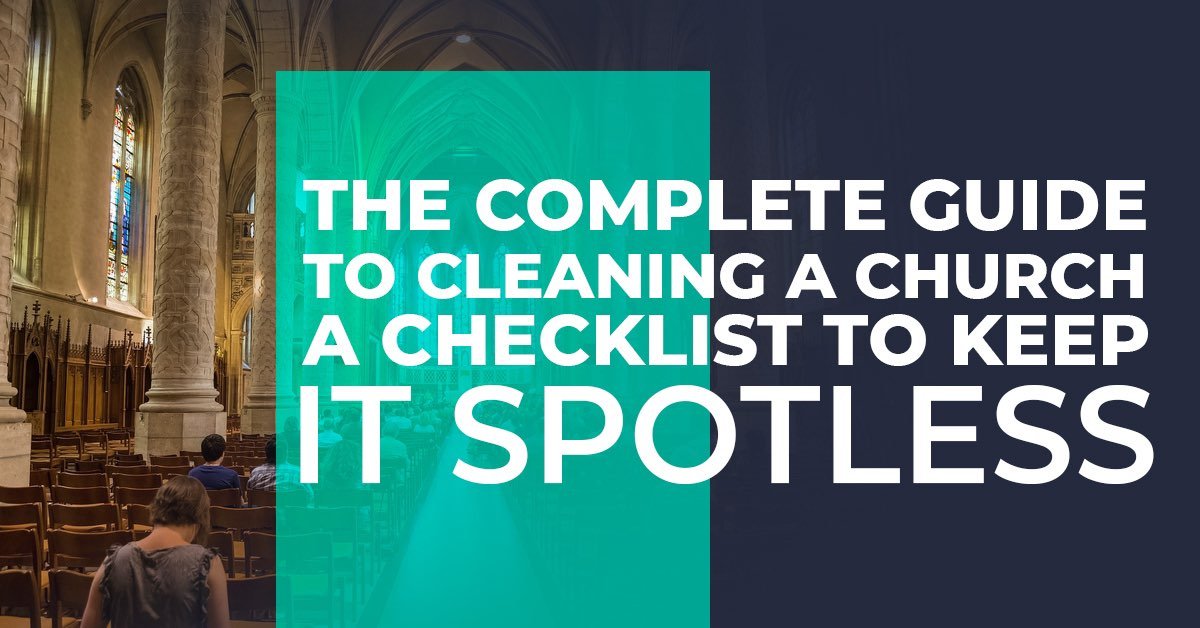Licensed And Insured

The Complete Guide to Cleaning A Church: A Checklist to Keep It Spotless
Maintaining a clean and hygienic environment is essential for any public space, especially for houses of worship. Churches, temples, mosques, and other religious facilities are not only places of worship but also community gathering spots, making them more susceptible to the spread of germs and viruses.
With so many people passing through these spaces regularly, it’s essential to keep them spotless and ensure a germ-free environment for everyone. This guide will provide you with a comprehensive checklist of cleaning techniques, sanitizing procedures, and disinfectant products to help you maintain cleanliness in your religious facility.
By following this guide, you can create a cleaning schedule, utilize janitorial services, and use the proper cleaning supplies and equipment to keep your house of worship a clean and safe place for all. So, whether you’re a member of the clergy, a cleaning staff member, or a volunteer, this guide will provide you with all the necessary information to keep your religious facility in top shape.
Why Is It Important To Clean A Church?

Cleaning a church is essential for several reasons. First, a neat and orderly setting fosters a welcoming and upbeat mood for worshippers, making them feel at ease. Also, it shows respect for the place of worship, which many people hold in high regard.
Second, constant cleaning keeps the congregation’s hygiene high and reduces the spread of bacteria. This is particularly crucial during the flu season. Thirdly, regular cleaning prevents dirt, dust, and other pollutants from harming the structure and its furnishings. In the long run, it can save money on repairs and replacements while extending the structure’s and its contents’ life.
Last but not least, maintaining a clean and well-kept church is a reflection of the congregation’s values and beliefs and shows a dedication to excellence and attention to detail in all facets of worship and community involvement. Overall, cleaning a church is a practical necessity and an important part of demonstrating respect, care, and reverence for the religious facility and its users.
Church Cleaning Checklist
To ensure that everything is cleaned properly and nothing is forgotten, it’s important to systematize the cleaning process by dividing the church facility into areas and determining the frequency of cleaning tasks (daily, weekly, monthly, and bi-annually).
1. Dust all surfaces: This includes all surfaces within the church, such as pews, altars, statues, and any other decorative items. Dusting can be done using a soft cloth or a duster.
2. Sweep and mop all floors: This involves sweeping or vacuuming all floors to remove debris or dust particles, followed by mopping to clean and disinfect the floors. Paying attention to high-traffic areas, such as entrances and aisles, is important.
3. Clean and disinfect bathrooms: This involves cleaning and disinfecting all bathroom surfaces, including toilets, sinks, and floors. This can be done using a disinfectant cleaner and a cloth.
4. Vacuum all carpets and rugs: Vacuuming carpets and rugs help to remove any dust or debris that may have accumulated. This can be done using a vacuum cleaner with a filter.

5. Clean all windows and mirrors: Cleaning all windows and mirrors involves removing any smudges or streaks from the glass. This can be done using a glass cleaner and a soft cloth.
6. Empty all trash cans and replace trash bags: This involves removing all trash from the church and replacing the bags in the trash cans.
7. Restock bathroom supplies: Restocking bathroom supplies, such as toilet paper and paper towels, is important to ensure that the facilities are well-stocked for visitors.
8. Polish all metal fixtures, such as candlesticks and chalices: Metal fixtures in a church, such as candlesticks and chalices, can accumulate dirt and tarnish over time, which can make them look dull and unattractive. Polishing these fixtures regularly can help maintain their shine and keep them looking their best.
9. Check and replace burnt-out light bulbs: Lighting is an important aspect of any church, as it helps create a warm and inviting atmosphere for worshipers. Burnt-out light bulbs can detract from the overall ambiance and make it difficult for people to see clearly. Checking and replacing burnt-out bulbs is an essential part of keeping a church clean and well-maintained.
10. Ensure all fire extinguishers are fully charged and in the proper location: Having functioning fire extinguishers in the proper locations can help prevent fires from spreading and minimize damage in the event of a fire. Checking that all fire extinguishers are fully charged and in the proper location is crucial for ensuring the safety of everyone in the church.
Check and refill all hand sanitizer dispensers: In light of the COVID-19 pandemic, it’s more important than ever to keep hand sanitizer dispensers well-stocked and readily available in a church. This helps prevent the spread of germs and keeps worshipers safe. Checking and refilling all hand sanitizer dispensers regularly is an important to maintaining a clean and healthy church environment.
How to Clean a Church
Cleaning a church can be a significant undertaking, but it can be a straightforward process with the right tools and techniques. Here are some tips to effectively clean a church:
- Dusting: Use a microfiber cloth or duster to remove dust from all surfaces, including pews, altars, and statues. Be sure to dust high-up areas, such as chandeliers and ceiling fans.
- Sweeping: Before mopping, it’s important to sweep the floors to remove any loose debris, such as dirt and debris from foot traffic.
- Mopping: Use a neutral cleaner when mopping floors, and change the water frequently to ensure that you’re not spreading dirt around. Be sure to mop under pews and other hard-to-reach areas.
- Disinfecting: Use a disinfectant cleaner when cleaning high-touch surfaces such as door handles, light switches, and bathrooms. Pay special attention to bathrooms, breeding grounds for germs and bacteria.
- Vacuuming: Use a HEPA-filter vacuum cleaner to remove dust and allergens from carpets and rugs. Regular vacuuming can help prevent the buildup of dirt, dust, and other allergens.
- Window cleaning: Use a squeegee and a microfiber cloth to clean windows. This will help remove streaks and leave the windows sparkling clean.

- Metal fixtures: Use a specialized metal cleaner to polish metal fixtures, such as candlesticks and chalices. This will help restore their shine and remove any tarnish.
- Safety first: When cleaning hard-to-reach areas, such as high windows or ceilings, use caution when climbing ladders or standing on chairs to reach these areas. Safety should always be a top priority.
- Eco-friendly products: Consider using eco-friendly cleaning products to reduce the environmental impact of your cleaning. This can include using natural cleaners or reusable cleaning cloths.
By adhering to these extra suggestions, you can ensure the church is meticulously cleaned and maintained, creating a warm and hygienic atmosphere for everyone who attends.
Common Challenges in Church Cleaning
- Limited access to certain areas: Churches often have areas considered sacred or restricted, such as the altar, sacristy, or other areas where religious items or documents are kept. This can make it difficult for cleaning staff or volunteers to access and clean these areas properly, as they may require special permission or clearance.
- Delicate and ornate decorations: Many churches have ornate decorations, such as stained glass windows, intricate woodwork, and sculptures. These decorations may be delicate and require special cleaning care to prevent damage. Cleaning staff or volunteers may require special training to care for these items properly.
- High-traffic areas: Churches are often high-traffic areas, especially during religious services or events. As a result, areas such as the pews, entryways, and restrooms require frequent cleaning to maintain cleanliness and prevent the spread of germs or viruses.
- Limited volunteers or staff: Church cleaning is often carried out by volunteers or a limited number of staff members. However, finding volunteers willing and able to commit to regular cleaning duties can be challenging. Additionally, staff may be overwhelmed with other responsibilities, making it difficult to prioritize cleaning tasks.
- Scheduling conflicts: Churches often host activities and events throughout the year, making scheduling regular cleaning tasks challenging. These events may occur during the same time or require using the same areas, making it difficult to clean and maintain the church properly.
- Limited storage space: Churches often have limited storage space, making storing cleaning supplies and equipment challenging. This can make it difficult to properly stock cleaning supplies and equipment, which can impact the quality of cleaning.
- Budget constraints: Churches may have limited cleaning supplies and equipment budgets. This can make purchasing high-quality cleaning supplies challenging or investing in new equipment. As a result, cleaning staff or volunteers may need to be creative in finding cost-effective solutions.
If your church has limited volunteers or staff, Spotless Magic World can provide a reliable and consistent cleaning schedule to ensure that your church is always clean and welcoming.
Wrapping Up
Keeping a church clean and well-maintained is essential to create a welcoming and healthy environment for worshippers and visitors alike. Regular cleaning helps prevent the spread of germs and illnesses and demonstrates respect and reverence for the religious facility and its users. Following the comprehensive checklist and using the proper cleaning supplies and equipment can keep any religious facility spotless and germ-free.
Remember to divide the church facility into areas and determine the frequency of cleaning tasks, such as dusting all surfaces, sweeping and mopping all floors, cleaning and disinfecting bathrooms, and checking and replacing any burnt-out light bulbs. Following these tips will make your church a clean, hygienic, and inviting place for all.



